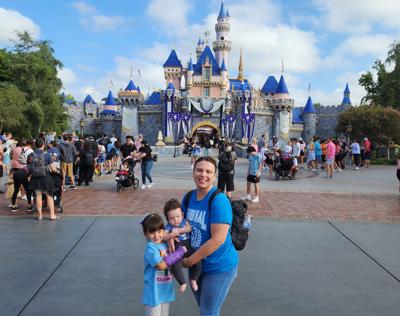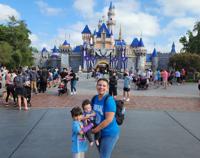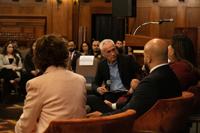
Cynthia Flores and her family at Disneyland. Photo courtesy of Cynthia Flores
This month, the 2024 National Latino Family Report was released, highlighting Latino families' educational and holistic health aspirations in the United States and providing a comprehensive study of the socioeconomic challenges impacting families with children, prenatal through five years of age.
The report, which stemmed from survey responses from over 1,500 Latino families across the United States, including Southern California, identified key issues, concerns, and aspirations that shape Latino's daily lives and vision for the future.
The study and surveys were carried out by Abriendo Puertas/Opening Doors, an evidence-based comprehensive training program developed by and for Latino parents with children, in partnership with UnidosUS, a Latino civil rights and advocacy organization and BSP Research.
The survey, which was conducted in both English and Spanish, was conducted online and by telephone interviews and the majority of the people surveyed were from New Mexico and Los Angeles County.
The report also highlights the resiliency, aspiration, and deep sense of community that characterize the Latino community. It shows that while facing economic and health challenges, Latino families with young children continue to seek support and solutions when it comes to mental health, housing, child care and economic stability.
According to the report, the top 6 issues that Latino families want the U.S. and local governments to address are the rising cost of living, improvement of wages and income, gun violence, lowering health costs, education and affordable, high-quality childcare.
"Latino families across the U.S. are not just surviving; they're thriving, demonstrating their contributions and a forward-looking vision for their children and communities," said Adrián A. Pedroza, national executive director of Abriendo Puertas/Opening Doors. "This report is a call to action for policymakers and community leaders to listen, engage, and collaborate with Latino families to realize their vision for a brighter tomorrow."
Regarding economic issues, the study showed that despite 37% of respondents reporting economic struggles, nearly a third of families with young children feel they are doing “somewhat” or “a lot better” compared to last year, while 33% feel their situation remains unchanged.
When respondents were asked what they had done to improve their family’s financial well-being this year, 48% said they looked for a better-paying job or promotion, 36% said they worked an extra job and 22% said they started their own business or acquired a side business.
According to the study, economic vulnerability is and continues to be a significant concern, with 26% of families having less than $100 in savings. However, 37% have started savings accounts for their children's future education, reflecting long-term financial planning amidst immediate challenges.
One of the major impacts that Latinos continue to experience is the high cost of living. In Los Angeles, housing is 137% more expensive than the U.S. average, while utilities are about 12% pricier. Participants in the study claimed they relied on two support structures within the Latino community: relying more on credit cards for emergencies (42%) and borrowing from friends and family (42%).
On the topic of health and well-being, the study showed that Latino families with young children want a greater work-life balance and community connectedness. “Parents emphasize a desire to spend more quality time with their children, alongside improving health and physical activity for their family,“ as stated in the study summary. “Neighborhood improvements are a key concern to families, they advocate for crime reduction, quality parks and playgrounds, and more access to healthy foods.”
When participants were asked what quality-of-life improvements they would like in their neighborhood, 46% of respondents said they would like to see more efforts to reduce crimes, followed by 38% who said they would like to have opportunities for better-paying jobs in their neighborhoods.
In addition to physical well-being, mental health emerges as a significant area of concern, with 32% of families stating that they are highly concerned about their children's mental health. The challenge is compounded by the difficulty in accessing professional support, with 36% reporting they could not afford mental health services.
Cyntia Flores, a Riverside, California, resident, had a difficult time obtaining childcare for her two children, Camila, four years old, and Karim, eight months old. Flores, who currently works as a school bus driver, said finding a childcare center that would accommodate her work schedule was difficult.
Over the past year, Flores interviewed and visited at least 10 different childcare centers near her home and although it was not easy to find, her persistence has paid off in finding Centro de Niños Nati Fuentes, an inclusive child care center that she was able to afford.
“I understand childcare is a lot of time, a lot of care, a lot of responsibility. But at the same time, the prices are sky-high. It's too much money. It's too much,” she said. “This has been one of the biggest barriers.”
Flores represents many of the parents who are not able to pay for childcare. The 2024 National Latino Family Report also showed the excessive need for early learning opportunities and childcare. Access to quality, affordable child care was the number one priority for survey respondents this year. 51% of respondents said their child had not received childcare, and 34% of them identified high costs as the main obstacle to not enrolling their kids in it.
Latinos who were able to afford childcare expressed the financial commitment that that entailed. Approximately 50% of families spend between $200 and $600 per month on child care—a substantial portion of their monthly income. In LA, that cost is much greater. As of March 2024, the average base rate for childcare providers in L.A. is $24.25 per hour.
Flores has also seen the long-lasting effects on early childhood development that childcare enhances. “For Camila, I have seen great progress. She already knows the colors, numbers, how to write her name,” Flores said “She was very shy. Now, with the other children, she gets to learn to share, learn how to develop. I have seen that she has evolved quite well.”
The study also sheds light on solutions that Latinos think should be implemented to boost economic and social well-being for them and their kids. 93% of the accounted Latinos support increased compensation for educators, signaling a recognition of the value and impact of quality teaching in early childhood development. In addition, 92% of families support funding initiatives to encourage Latinos to earn degrees and credentials, facilitating their entry into the early childhood workforce.
To learn more about the report and receive more parent services, please visit https://ap-od.org/parent-toolbox/











(0) comments
Welcome to the discussion.
Log In
Keep it Clean. Please avoid obscene, vulgar, lewd, racist or sexually-oriented language.
PLEASE TURN OFF YOUR CAPS LOCK.
Don't Threaten. Threats of harming another person will not be tolerated.
Be Truthful. Don't knowingly lie about anyone or anything.
Be Nice. No racism, sexism or any sort of -ism that is degrading to another person.
Be Proactive. Use the 'Report' link on each comment to let us know of abusive posts.
Share with Us. We'd love to hear eyewitness accounts, the history behind an article.